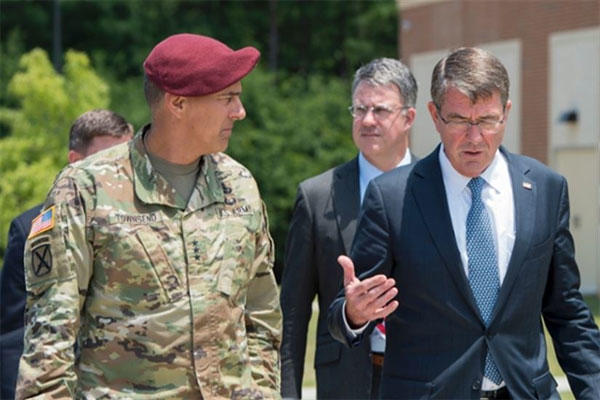Army Lt. Gen. Stephen Townsend took command Sunday in Iraq and Syria with a pledge to speed up the campaign against ISIS and take back Mosul and Raqqa "on my watch."
"I don't want to make promises, but I intend to have Mosul and Raqqa done on my watch," Townsend told Stars and Stripes on the sidelines of the change of command ceremony in Baghdad in which he succeeded Army Lt. Gen. Sean MacFarland.
Townsend did not say how long his "watch" would extend but MacFarland served as commander of Combined Joint Task Force-Inherent Resolve for nearly a year in the overall effort of U.S. and coalition forces against the Islamic State of Iraq and Syria, or ISIS. Iraq President Haider al-Abadi has predicted that Mosul would be taken back by the end of this year.
Townsend also had a warning for the Syrian air forces, which bombed last week near U.S. Special Forces trainers and advisors in northeastern Syria.
"We've informed the Russians where we're at" and they "tell us they've informed the Syrians, and I'd just say that we will defend ourselves if we feel threatened," Townsend told CNN Saturday.
Two Syrian Su-24s bombed last Thursday in the Syria city of Hasakah, where fighting has broken out between Kurdish militias backed by the U.S. and forces supported by the regime of Syrian President Bashar al-Assad.
In response, the U.S. scrambled F-15 fighters but the Syrian jets left the area before the U.S. warplanes arrived, Navy Capt. Jeff Davis, a Pentagon spokesman, said last week. The next day, the U.S. dispatched F-22 stealth fighters after Syrian Su-24s again flew in the area.
Army Gen. Joseph Votel, the commander of U.S. Central Command who attended the change of command ceremony, praised MacFarland's contributions to the anti-ISIS campaign.
Since MacFarland took over, Iraqi security forces backed by U.S. and coalition airpower have retaken Ramadi and Fallujah in Iraq's Anbar province and have begun setting up a base in northern Iraq to serve as a "springboard" for the long-awaited offensive to retake Mosul.
In addition, the U.S.-backed Syrian Arab Coalition earlier this month took the northeastern Syrian city of Manbij, seen as a stepping stone for an eventual push against Raqqa, the self-proclaimed ISIS "capital."
Townsend, a veteran of Iraq and Afghanistan and commander of the XVIII Airborne Corps based at Fort Bragg, North Carolina, echoed the warnings of the CIA and the FBI that ISIS will remain a terrorist and insurgency threat even after the fall of Mosul and Raqqa.
"The enemy at that time [will] have to crawl into holes and little villages in the desert and hide, and he'll become an insurgency, which is a new and dangerous phase in its own right, and we'll have to deal with that," Townsend told Stars and Stripes. "But right now, my focus is on destroying the physical caliphate."
--Richard Sisk can be reached at Richard.Sisk@Military.com.



























